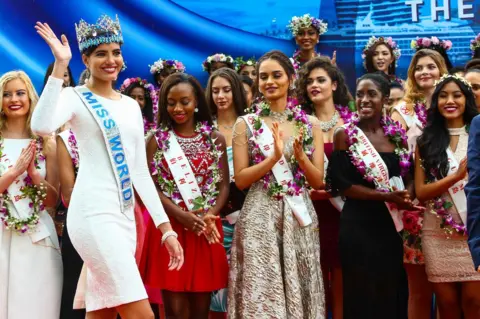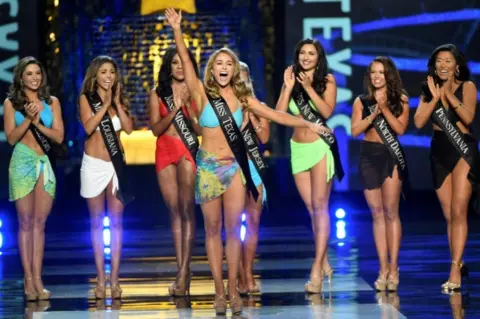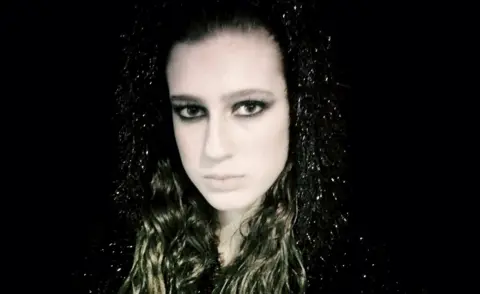Miss World Affairs: How beauty queens got political in 2017
 STR/AFP/Getty Images
STR/AFP/Getty ImagesImagine a beauty pageant, and you're probably picturing a relay of stunning women with huge hair, some tearful pleas for world peace, and a tiara-based cat-fight.
But beyond the diamantes and the swimsuit round, the contestants are getting ever-more political.
Beauty queens in Chile, Turkey, Lebanon, Myanmar, Peru and the US have all made headlines in 2017 for unexpected comments or perceived dissent - and many have lost their crowns in the process.
So as Miss World looks increasingly like Miss World Affairs, how can a pageant winner keep both her title and her opinions?

1. Don't cause a diplomatic incident
Last week, Chilean model Valentina Schnitzer sparked outrage by declaring, "the sea belongs to Bolivia" at a South American beauty pageant.
The sea in question is the Pacific Ocean - subject of a dispute between Chile and its landlocked neighbour for more than a century.
Ms Schnitzer told the Reina Hispanoamericana 2017 pageant in Bolivia: "We are with you, we want to keep fighting for your rights. Really, the Chilean people, all my people, all my colleagues, the people I talk to, [say] the sea belongs to Bolivia."
The territorial scrap is under review by the International Court of Justice - but a separate diplomatic debate quickly emerged on Twitter.
Bolivia's President Evo Morales sent his support to the Chilean beauty, praising her "courageous" stance.
Allow Twitter content?
Her countryfolk were less impressed, with one tweeting: "Miss Chile lives here? She does not seem Chilean giving away the sea."
But she already had, of course - and that, for some, was the problem.

2. Mind your holiday plans... and selfies
In some parts of the world, a beauty queen must mind her travel plans as well as her mouth.
Amanda Hanna is Swedish-Lebanese, and held the Miss Lebanon Emigrant 2017 title for just one week before being stripped of it.
Her crime? She had visited Israel for an academic trip in 2016, on her Swedish passport.
Lebanon and Israel are officially at war, though they have observed a ceasefire since 2006.
The same inter-state frostiness caused ructions a few years earlier at 2015's Miss Universe contest, when Miss Lebanon Saly Greige posed for a selfie with Miss Japan, Miss Slovenia - and Miss Israel.
 Instagram / Doron Matalon
Instagram / Doron MatalonShe was accused of fraternising with the enemy, and the picture went viral. Ms Greige swung into damage limitation mode on Facebook.
"Since the first day of my arrival to participate in Miss Universe, I was very cautious to avoid being in any photo or communication with Miss Israel, who tried several times to take a photo with me," she wrote.
"I was having a photo with Miss Japan, Miss Slovenia, and myself; suddenly Miss Israel jumped in, took a selfie, and put it on her social media."
Her explanation worked, and she kept her title despite the outcry.

3. Avoid a viral YouTube moment
The Miss America contest used to be a politics-free zone, but has embraced controversial Q&As to lure prime-time audiences thirsty for a "YouTube moment" - where a hapless contestant says something awkward and the footage goes viral online.
This year, Miss Texas Margana Wood was asked about the violent neo-Nazi protests in Charlottesville, where counter-protester Heather Heyer was killed. She branded the death a "terrorist attack", and said Donald Trump should have made a statement sooner.
Her answer got as much press attention as the ultimate winner.
 Reuters
ReutersThe Q&A is considered such an art form that serious contestants hire tutors to help them master it.
Pageant coach Valerie Hayes told the BBC: "Ideally you want to be aware of the topic, state your position in a logical, non-offensive way. That's the goal...
"The statistical weight of the top 5 questions is not significant enough to alter the result of the pageant. You'd have to say something really shocking, like, 'Yeah - and I recently broke up with my boyfriend and beheaded him and buried him in the backyard!'"
Once the winner is crowned, though, the crackdown is swift: Before meeting the press, the giddy young woman gets a stern talking-to about her new role as Miss America: Brand Ambassador.

4. Don't compare your period to a coup
Five thousand miles east, Miss Turkey 2017 seemingly forgot any pep talk she received. Itir Esen, 18, posted an awkward tweet about last year's attempted coup - and found herself dethroned just hours after winning.
"I got my period on the morning of the July 15 martyrs' day. I'm marking the day by bleeding as a representation of the martyrs' blood," the teenaged winner wrote.
 Vittorio Zunino Celotto/Getty Images for IMG
Vittorio Zunino Celotto/Getty Images for IMGTurkey's President Erdogan often uses the term martyrs to refer to those killed in 2016's anti-government uprising, but unfortunately for Ms Esen her comparison was deemed disrespectful to the dead.
"It is not possible for the Miss Turkey Organization, whose aim is to promote Turkey worldwide and to contribute to its image, to accept such a posting," pageant bosses sniffed.
Still, the fallen queen got off lightly compared to another former Miss Turkey. In 2016, one-time title-holder Merve Buyuksarac was given a 14-month suspended prison sentence for "insulting the president" after she shared a satirical poem on social media.
 Getty Images
Getty Images
5. Want to protest? Get permission, and go global
Pageant coach Ms Hayes says title winners are presented with reams of contracts outlining the standard of behaviour expected of them.
These can be used to keep them in line - or pull the plug on the grounds of "contract breach" if they damage the pageant's brand.
In October, 19-year-old Shwe Eain Si claimed she had been stripped of her Miss Grand Myanmar title because she made a graphic video about the violence in the country's Rakhine state, blaming Rohingya militants for spreading it.
The glamorous teenager might have expected a more sympathetic reception in her homeland, where many view the Rohingya as illegal immigrants. But overseas, with UN experts warning of a "humanitarian nightmare", her views would raise dismay - and bad PR for her pageant.
The company that crowned Shwe Eain Si, Hello Madam Media Group, told the BBC that she had not behaved like a role model, and that the decision "does not concern... her Rakhine video".
 Shwe Eain Si
Shwe Eain SiWhichever side you believe, the question remains: How to make a hard-hitting political point without falling foul of touchy pageant organisers?
Why not take a cue from Peru, and get them on side?
Last week at Peru's Miss Universe Pageant, the 23 would-be winners recited shocking statistics on violence against women instead of their bust, waist and hip sizes.
The pageant organisers joined in by prior arrangement, showing news footage about prominent gender-based attacks.
The stunt was applauded around the world - and made a major impact on viewers expecting the traditional swimsuit showcase.
The contest's organiser, Jessica Newton, told AFP: "Unfortunately there are many women who do not know [about prevalent violence against women], and think they are isolated cases.
"I think the fact that you are looking at your regional representative, at the queen of your department [region], giving open and real figures about what is happening in our country is alarming."
Later this month, the contestants plan to lead a march highlighting violence against women in Peru's capital, Lima.
